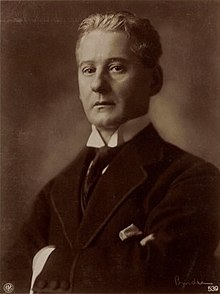Paul Biensfeldt

Paul Biensfeldt (born March 4, 1869 in Berlin , † April 2, 1933 in Berlin-Halensee ) was a German film and theater actor.
Life
Paul Biensfeldt was part of Berlin theater life for 40 years. He had his breakthrough in 1893 in Max Halbe's drama Jugend im Residenztheater . He then played under Otto Brahm , later under Max Reinhardt at the Deutsches Theater . Biensfeldt was a popular ensemble player with Reinhardt for 25 years and one of his busiest comedians. Carl Sternheim wrote him the role of Krey in his comedy Bürger Schippl in 1913 .
Between 1913 and 1933 Biensfeldt was involved in over a hundred silent and sound film productions and was repeatedly cast by the most famous directors such as Fritz Lang , Ernst Lubitsch , Friedrich Wilhelm Murnau , Paul Leni , Robert Wiene and Joe May . He mostly appeared in supporting roles as valet, dance teacher, policeman or nobleman. He had slightly larger roles in the early stages of the film in the 1910s, for example in the Ewers film The Ideal Wife (1913) and several times alongside Henny Porten . His best-known silent film roles include the father Lil Dagover , the magician who turns into a cactus at the end, in the Chinese episode of Fritz Lang's The Tired Death , as well as the chamberlain Lebel, who is supposed to teach Pola Negri polite behavior, in Lubitsch's Madame Dubarry .
Paul Biensfeldt was buried in the Wilmersdorfer Waldfriedhof Güterfelde near Berlin (Dept. U-212).
Filmography (selection)
Web links
- Paul Biensfeldt in the Internet Movie Database (English)
- Paul Biensfeldt at filmportal.de
- Paul Biensfeldt at cyranos.ch
- Pictures by Paul Biensfeldt In: Virtual History
| personal data | |
|---|---|
| SURNAME | Biensfeldt, Paul |
| BRIEF DESCRIPTION | German film and theater actor |
| DATE OF BIRTH | March 4, 1869 |
| PLACE OF BIRTH | Berlin |
| DATE OF DEATH | April 2, 1933 |
| Place of death | Berlin-Halensee |